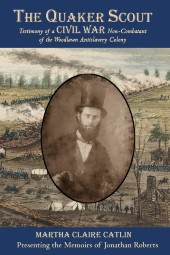Excerpt below from the National Tribune (1891) - click here to view full article.
The Quaker Scout.
Life in the Old Dominion Before and During the War.
National Tribune
November 19, 1891
At another time I had some business to attend to at Fairfax Courthouse during court time, which place was about 16 miles from where I lived. I also stopped on business to see Col. Silas Burke, who at that time was Chief Justice of the County Court. After getting through my business with Col. Burke, he desired me to wait a little while he got his horse, saying he would ride with me to the Courthouse. After he had gotten ready and we had started, Col. Burke said he desired this opportunity to have a private talk with me. He said some of his neighbors had been telling him that I was a sneaking
BLACK ABOLITIONIST;
that I was trying to induce the slaves to run away; that he did not believe it, and had sought this opportunity to hear from my own lips.
This took me all aback. Instantly all the horrors of the situation stared me in the face, and I seemed to see that he alone stood between me and lynching. I could not answer right away. Then something passed through my mind which said: “Make a clean breast of it.” I instantly understood, and said to Col Burke:
“You know that I am a Quaker, and that Quakers are all anti-slavery people.”
He answered that he knew all that, and that was all right, but they had told him that I was trying to induce slaves to run away. I told him I did not advise any slaves to run away from their masters, but if anybody white or black, came to me for advice, I gave them the best I had; but nevertheless, I believed slavery to be a great evil, one of the greatest this country was suffering under. It kept the slaves down to the foot of the ladder of civilization, and it
DRAGGED THE SLAVEHOLDER
down to their level; it made the white race lazy, domineering, overbearing, and beastly, and was therefore worse for them.
Col. Burke immediately responded vehemently and earnestly in the emphatic way that it was true, too true. He then said he was a large slaveholder; had inherited them from his father; was brought up with them, and that if it was in his power to set his slaves free, so they could stay here, he would, and he would hire them. “But,” he said, “you know the law will not allow me to set them free here, and I have no money to buy them homes anywhere North, and to send them away after toiling so long for me with nothing, I cannot do that; and so I have to get along as well I can. But as for you, you are all right. I wish we had many more like you. And now I am ready for those fellows. No one shall hurt you if I can help it.” I do not know who he meant by “those fellows,” but I had my suspicions, for in less that two weeks from that time I could perceive a marked change in certain ones in their behavior toward me.
Source Material:
 The Quaker Scout: Testimony of a Civil War Non-Combatant of the Woodlawn Antislavery Colony
The Quaker Scout: Testimony of a Civil War Non-Combatant of the Woodlawn Antislavery Colony
By Martha Claire Catlin, presenting the memoirs of Jonathan Roberts